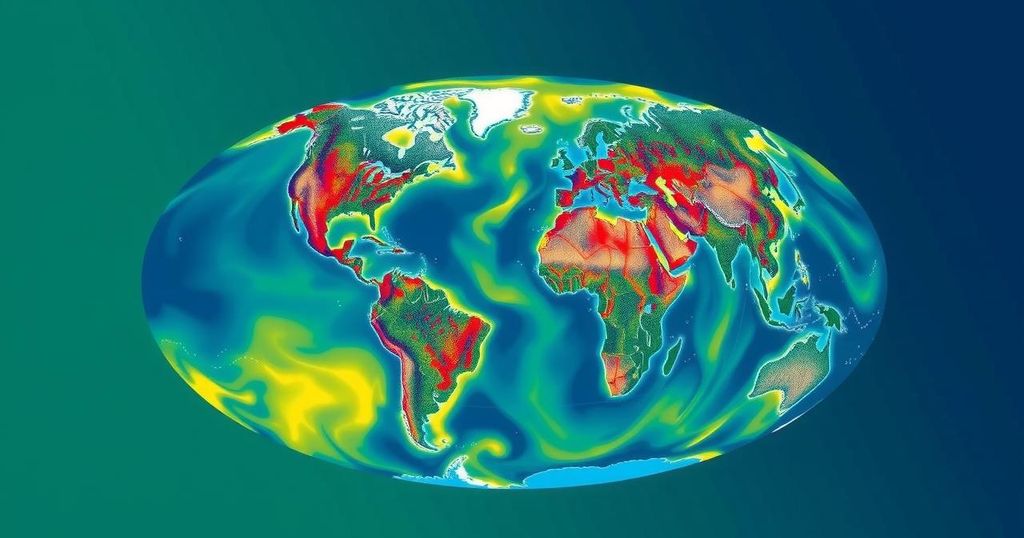A 12-member research team received the ACM Gordon Bell Prize for developing a climate emulator that significantly enhances climate change predictions. Their innovative work utilizes exascale computing to address high-resolution Earth System Models, effectively reducing computational and storage requirements while advancing scientific understanding of climate dynamics.
The ACM Gordon Bell Prize for Climate Modelling was awarded to a team of 12 researchers for their groundbreaking project entitled “Boosting Earth System Model Outputs And Saving PetaBytes in Their Storage Using Exascale Climate Emulators.” This initiative aims to enhance the accuracy of climate change predictions while addressing substantial computational and storage challenges. By utilizing exascale supercomputers, capable of executing quintillions of calculations per second, researchers have developed high-resolution Earth System Models (ESM) that significantly advance climate science.
The consortium of experts comprises Sameh Abdulah, Marc G. Genton, David E. Keyes, Zubair Khalid, Hatem Ltaief, Yan Song, Greorgiy L. Stenchikov, Ying Sun from King Abdullah University of Science and Technology, Allison H. Baker from the NSF National Center for Atmospheric Research, and others from NVIDIA, St. Louis University, and the University of Notre Dame. The team’s work is crucial given the alarming rate of climate breakdown; intensified natural disasters and biodiversity loss signal an urgent need for innovative solutions.
To tackle the immense computational load associated with high-resolution ESMs, the award-winning team developed a climate emulator that optimizes processing and storage capacity. This emulator allows for enhanced data management and effective use of various computational resources, which is essential for managing the large datasets generated by climate models. The design aims to reduce storage needs by several petabytes, vastly improving the efficiency of climate simulations without compromising on detail.
The high-resolution climate model designed by the team encompasses over 54 million spatial locations and utilizes advanced computational techniques, including Spherical Harmonic Transform and Cholesky factorization, to achieve unprecedented accuracy. The authors state, “We utilize the spherical harmonic transform to stochastically model spatio-temporal variations in climate data. This provides tunable spatio-temporal resolution and significantly improves the fidelity and granularity of climate emulation, achieving an ultra-high spatial resolution of 0.034° (∼3.5 km) in Space.”
The recognition of the ACM Gordon Bell Prize took place during the International Conference for High Performance Computing, Networking, Storage, and Analysis, highlighting the essential role of advanced computing in addressing global challenges. The implications of this research extend beyond climate change, indicating potential advancements in machine learning and AI-driven methodologies applicable to various prediction tasks in climate science.
The pressing issue of climate change necessitates innovative approaches to enhance our understanding of its dynamics and impacts. With the growing frequency of natural disasters and ecological disruptions attributed to global warming from fossil fuel consumption, the urgency for advanced climate modelling becomes paramount. Climate modelling has evolved significantly since its inception in the 1950s, and the recent introduction of exascale computing capabilities opens new avenues for research. Exascale supercomputers facilitate high-resolution Earth System Models (ESMs) that can process extensive climate data, providing a more refined insight into climate behaviour while addressing the substantial computational resource requirements inherent in such models.
The ACM Gordon Bell Prize for Climate Modelling underscores the critical intersection of computational science and environmental research. The recognition of the twelve-member team not only highlights their innovative contributions to the field but also emphasizes the necessity of advanced computing solutions in addressing climate change. Their development of a climate emulator promises to revolutionize data storage and processing, thus enhancing the overall effectiveness of climate modelling and research strategies. This initiative marks a significant step forward in the quest for better climate prediction and management solutions.
Original Source: www.eurekalert.org






